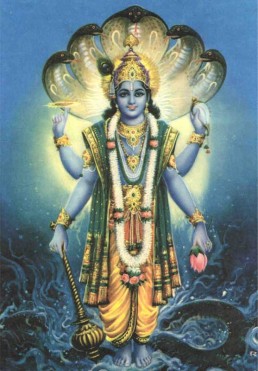Consecutively, in the two previous stanzas, it was repeatedly asserted that the goal sought in spiritual life is one, “HAVING ATTAINED WHICH THERE IS NO RETURN EVER.” The very same idea, that Perfection gained is an irrevocable fact and that there is no more any fear of return to the natural stupidities of a limited ego-centric life, is being emphasised in this stanza also. Repetition is a method of emphasis in all scriptural literature. No doubt, this method is not used everywhere. Wherever logic is available, ideas are nailed in by logical reasonings. but there are realms, into which the teacher alone has admission in the beginning and not the student-class, and therefore, the Rishis had no other go but to repeatedly assert for our acceptance, the nature and condition of the unknown experience of the Infinite.
This glorious State-of-Perfection is the Goal which almost all stanzas in the Geeta consistently indicate and though it is an Absolute State, here an honest attempt is being made to describe It in terms of finite phenomena.
NEITHER SUN, NOR MOON, NOR FIRE ILLUMINES THAT — Herein are enumerated almost all the sources-of-light, blessed by which the physical eyes experience vision. To see a thing is to know it; and in order that the organ-of-vision might use its power of seeing, it is not only sufficient that objects are in front of the sense-organ, but they must also be bathed in light. In the medium of light alone can the eyes see forms and colours. Again, not only do the eyes perceive; but the ears pick up sounds, the nose the smell, the tongue the tastes, and the skin the touch. Each instrument perceives its objects. Even this is not all. We can perceive our feelings and also our ideas. The ‘light’ in which we thus perceive all our sense-objects, all our emotions, and all our thoughts, is the Light of Consciousness by which alone we become AWARE of all our experiences.
This Light of Consciousness cannot be illumined by the gross sources of light available in the world outside, such as the Sun, the Moon or the Fire. In fact the very light of the Sun, or the Moon, or the Fire is an ‘object’ of our Consciousness; we are constantly conscious of it. An OBJECT of perception cannot illumine the SUBJECT that perceives it — the SUBJECT and the OBJECT cannot be at any time one and the same. The AWARENESS by which we come to experience all our life’s joys and sorrows is the Eternal Self, and to realise that Consciousness is indicated as the Supreme Goal by the Geeta.
THAT IS MY SUPREME ABODE — This State of Conscious-ness into which we can rise on transcending the agitations of the mind and intellect is described here as the Abode of the Divine, the Dwelling Place Supreme, wherein we can confidently make an appointment with Truth and “meet” the Infinite!
Utilitarians as we are, certainly all seekers will doubt whether the experience of Truth is worth having at such a tremendous effort. Is there not a risk of our falling back into our present confusions and getting deluded by a finite pain-ridden world of plurality? This fear is allayed and the seekers are assured, for the third time continuously in this stanza, when Krishna qualifies, “MY SUPREME ABODE” as one “TO WHICH HAVING GONE NONE RETURNS.”It is an experienced fact that when one has mastered a knowledge, it is almost impossible for one to make any more mistakes in it; to a great musician, to sing deliberately out of tune, in disharmonious notes, is as difficult as it is for a beginner to sing correctly. Having known a language, to talk ungrammatically is as difficult as it is for the illiterate to talk correctly. If, in the imperfect world of imperfect knowledge, a cultured man, educated and artistic, cannot easily fall back to the levels of the uncivilised and the illiterate, how much more must it be an impossible act for the Perfect to come back and fall into the earlier confusions which are created by ‘ignorance’!
This is one of the rarest stanzas in the religious literature of the world which, in so simple a style, has indicated, so exhaustively, the Unconditioned-Pure-Self, the Infinite-Reality. In Hinduism, it has always been emphasised that there is a continuity of existence after death and an individual continues his biography in a new embodiment under a new set of environments. The individuality, thus undergoing experiences of birth and death repeatedly, is called the Jiva, or the embodied-self. This Jiva is the Eternal Light of Consciousness, playing upon, and SEEMINGLY conditioned by, the subtle-body, constituted of the mind-intellect equipment.
In short, death is only a phenomenon, wherein a given subtle-body changes its physical-equipment, seeking ‘fresh fields and pastures new’ for its expression and expansion. This process is not the reaching of the Infinite; for, ‘MY ABODE’ IS THAT ‘WHEREIN HAVING GONE THERE IS NO RETURN.’
TO CLEAR THIS POSSIBLE DOUBT THE STRUCTURE AND THE NATURE OF THE EGO ( JIVA) IS EXPLAINED IN THE FOLLOWING STANZAS:

